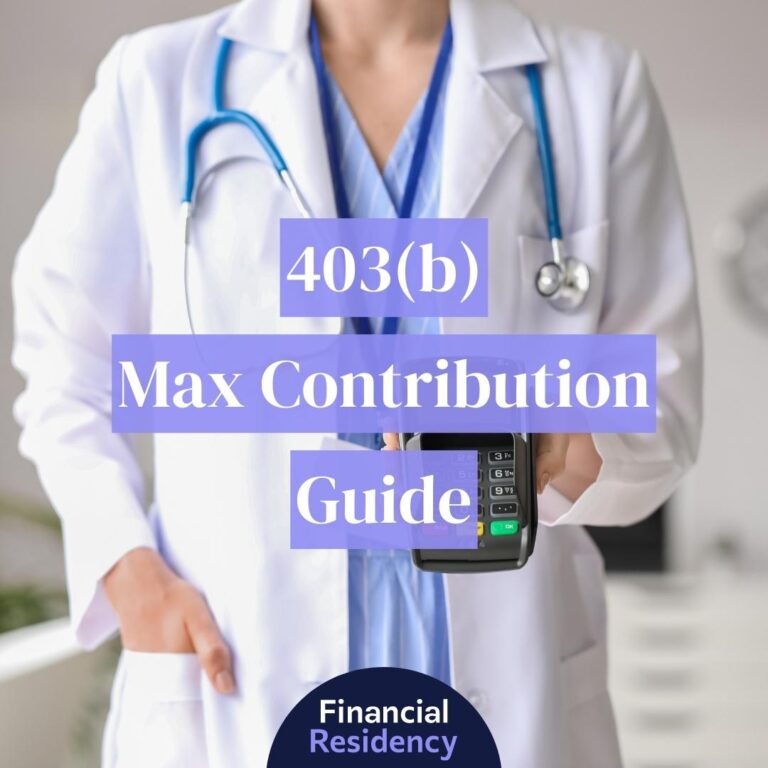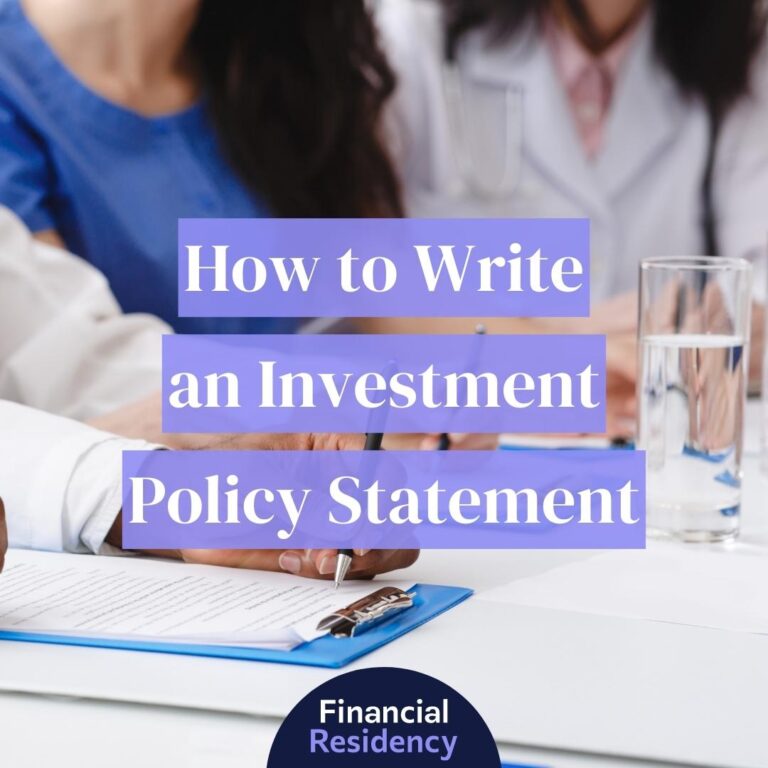How you invest $25k is important. Even though you have a higher-than-average income as a doctor or medical professional, no one likes to lose money.
Some of the best ways to invest $25,000 are easier than most people think, providing a great ROI and helping you reach your financial goals.
If you invest $25,000 the right way, you can make your money grow, helping to increase your net worth and reach your financial goals.
Best Ways To Invest $25,000
I’ve identified the five best ways to invest $25,000 based on their ROI, risk level, and overall advantages.
- High-Yield Savings Account (HYSA)
- Certificate of Deposit (CDs)
- Real Estate
- Index Funds
- Exchange-Traded Funds (ETFs)
1. High-Yield Savings Account (HYSA)
Look at high-yield savings accounts for a no-risk investment with a decent ROI. Depending on the market, they pay much higher APYs than standard banks and pose no risk if you use an FDIC-insured bank.
If the bank fails but is FDIC-insured, your funds are protected up to $250,000, so you don’t have to worry about losing any money.
HYSAs are great for liquid investments, keeping cash on hand for unexpected expenses while allowing you to earn interest on the funds.
2. Certificate of Deposit (CDs)
If you’re looking for even higher interest rates with little to no risks, consider Certificates of Deposit, or CDs.
They are offered in various terms ranging from a few months to several years and often pay higher interest rates than savings accounts. The longer you lock up your funds, the higher the interest rate they pay.
The downside is that you cannot access your funds until the CD matures. If you do, you’ll pay a penalty, usually worth three months of interest. Like HYSAs, only invest in CDs at FDIC-insured banks to protect your investment.
3. Real Estate
Real estate investing is a great way to diversify your portfolio and leverage your investment. A $25,000 investment in real estate could be a sizeable down payment on an investment home.
You can leverage the investment with mortgage financing and earn monthly rental income plus capital appreciation on the property.
Real estate investments are highly illiquid because it could take months to sell the house, so only choose this option if you’re willing to keep the funds locked up for at least several years.
4. Index Funds
Index funds are mutual funds that follow a market, such as the S&P 500. The funds buy all investments in the index, providing broad diversification without the need to hand-select investments for your portfolio. Index funds trade at the end of the trading day, once per day.
Index funds may contain stocks, bonds, or both, and they are passively managed, so you don’t have to worry about excessive capital gains taxes.
Since index funds don’t try to beat the market but match it, there are fewer management expenses than traditional mutual funds, keeping your expense ratios lower.
INVESTMENT AND INSURANCE PRODUCTS ARE: NOT A DEPOSIT • NOT FDIC INSURED • NO BANK GUARANTEE • MAY LOSE VALUE5. Exchange-Traded Funds (ETFs)
ETFs or Exchange-Traded Funds are also baskets of securities, but they don’t necessarily mimic an entire market. ETFs can be based on sector, industry, index, or commodity. Like index funds, ETFs are automatically diversified and have low expense ratios.
Unlike index funds, ETFs trade throughout the stock trading day. They have ticker symbols and are passively managed, keeping your expenses and tax liabilities low.
Is $25,000 a Good Amount To Invest?
$25,000 is an excellent start to your investment portfolio. It surpasses most minimum investment requirements for basic investment accounts and gives you a head start on reaching short and long-term goals.
The key to investing $25k is to diversify your portfolio; don’t put all your money in one investment.
Leave some money as liquid as possible to access in emergencies, and invest some more aggressively to aid in reaching your long-term financial goals.
Factors To Consider Before Investing Your $25k
So, how do you decide how to invest your $25k? Here are the top factors to consider.
Financial Goals
Decide what you want to do with the earnings you invest. Do you have short or long-term goals? Consider what they are and how long it would take to achieve them.
For example, if you’re investing $25,000 to grow it for a down payment on a house, you should invest more aggressively than if you just wanted a safe place to keep your cash while seeing a little growth.
Emergency Fund
If your $25k is your emergency fund, don’t invest it in anything risky or non-liquid. Your best bet is to keep it in an HYSA or CD.
Investing your emergency fund in index funds or real estate would tie up your funds and risk financial issues if you had an emergency and couldn’t immediately access the funds.
Debt Accumulation
Evaluate the amount of debt you carry as well as the type. If you have high-interest debt, like credit cards, consider using the $25k to pay off the debt or at least minimize your total debt.
The high interest rates far exceed the interest you’d earn on any investment, so paying the debt off first makes sense.
But, if your only debt is a car loan, mortgage, or student loan debt, you may be better off investing the funds and paying the debts down as you can.
Risk Tolerance
Every investment has a different risk level. Decide what you’re comfortable with before investing your $25k.
The higher the risk, the greater the reward, but you shouldn’t invest in something that will keep you up at night, wondering if you’ve made a mistake.
High-yield savings accounts are about as conservative as you can get, whereas index funds or real estate are on the riskier end but have greater rewards.
Time Horizon
The shorter your time horizon, the less risk you should take because you have less time to compensate for a loss.
Consider your goals and how long you have to reach them to decide which investment suits your needs the most. The longer you have, the more risk you can take, resulting in potentially greater capital gains.
Diversification
Diversifying your portfolio is vital. No matter your risk tolerance or goals, diversifying your funds across different investments reduces the risk of a total loss.
Consider spreading your funds across several conservative and riskier investments to see the greatest return on your investment.
Asset Allocation
How you allocate your funds depends on your goals. If your goals are shorter-term, you should invest your $25k in more conservative investments, such as HYSAs and CDs. This is the case for goals you want to achieve in the next few years.
On the other hand, if you’re investing for retirement and recently began your career, you have 20 to 30 years before retirement and can invest more aggressively to make your funds grow faster.
Do You Have a Financial Advisor?
If you need help determining where to invest your $25k, talk to a financial advisor.
There are many options for working with a financial advisor, including:
- One-on-one in person
- Online with a discount broker that provides phone/video support and online support
- Robo-advisors/automated systems that build and manage your portfolio without human interaction
Common Mistakes To Avoid When Investing $25k
Before investing your $25,000, here are some common mistakes to avoid.
Investing Without a Plan
Know why you’re investing. List short- and long-term goals, and consider your risk tolerance. Determine which investments will help you reach your goals and follow the plan.
Always follow up on your progress to determine if you need to reallocate your investments. As the market changes, you may find that your investments become unbalanced based on what you initially set up. Reallocating your portfolio can help you get back on track.
Chasing High-Risk
Know your risk tolerance, aka what you can handle. Don’t chase high-risk investments for the thrill of a higher return. If you have short-term goals or can’t stand to lose any of the $25k, stick to more conservative investments.
Don’t get caught up in the hype of higher-return investments that could cause you to lose everything if you aren’t careful.
Ignoring Fees and Costs
Know the costs involved in each investment. Conservative investments such as HYSAs and CDs typically don’t have fees unless you withdraw funds from the CD early.
However, other investments such as stocks, bonds, ETFs, and index funds, have fees that decrease your profits.
Look at the big picture to understand the total cost of your investment and how much money you’d walk away with after paying the fees.
Emotional Decision-Making
Don’t stalk your investments. Doing so only leads to emotional decisions. For example, if the stock market crashes, you’re more likely to bail if you’re watching your investments like a hawk. However, you cannot recoup your investment if you bail and the market recovers.
Try to remain unbiased and avoid making emotional decisions. Only invest the amount you are comfortable losing and make decisions based on the big picture, not an isolated event.
Frequently Asked Questions
Knowing the best ways to invest $25k is important and is solely based on your goals and risk tolerance. Diversifying your portfolio is key to reaching your goals.
What Is the Best Investment for $25,000?
The best investment for $25,000 depends on what you can handle. For someone looking for somewhere safe to keep their emergency fund, HYSAs are the best bet. But, if you want to grow your investment, you’re better off investing in ETFs, index funds, or real estate.
Learn More:
Is $25k Good in Savings?
$25k is good in savings, especially if that covers three to six months of your expenses. While you should keep only a little cash ‘idle,’ having enough set aside for your emergency fund is key to handling unexpected costs.
How To Invest $25k Safely?
There’s always a risk when investing, but the best bet to invest safely is to diversify your funds. Put some money in risk-free investments like savings or CDs, and invest other funds in riskier investments that will provide a greater ROI.
What Are the Best Stocks To Consider for Investing $25,000?
Stock prices change often, but some of the best stocks to consider investing your $25k in include Microsoft, e.l.f, and Visa.
How To Turn $25,000 Into a Million?
To turn $25,000 into a million, you must determine the timeline you want to achieve this goal. At 15% return, it would take 25 years to turn it into one million dollars with no other contributions.
The shorter your timeline, the more contributions are required to reach the $1 million goal.
What Will $25,000 Be Worth in 15 or 20 Years?
Given a rate of return of 5.2%, $25,000 will be worth $53,000 to $68,000. The actual return depends on your rate of return, fees, and regular contributions.
The Bottom Line
No two physicians will invest $25k the same way. Those with shorter timelines and lower risk tolerances will invest more conservatively than physicians with higher risk tolerance or longer-term goals.
There isn’t a right or wrong way to invest your funds. The key is to look at the big picture and know what you can handle and want to achieve.





